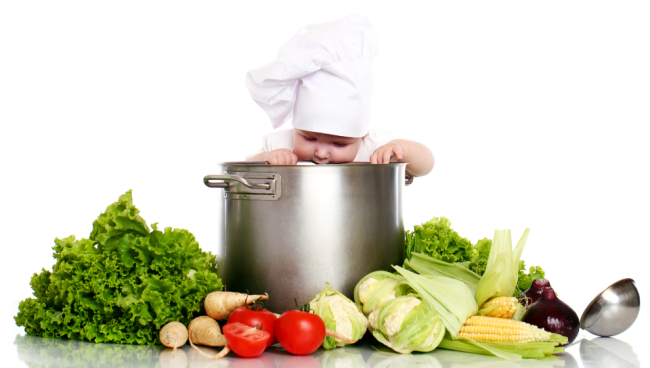This question is always very tricky to give a true answer to, as there are various factors one needs to consider.
Firstly, remember your baby’s stomach is only as big as their little fist, so don’t overload their plate – rather give a balanced healthy meal full of tasty nutritious foods.
Secondly, your baby can sometimes have an off day, or week even, due to illness or teething which can lead to loss of appetite or there could be some distractions causing them to show disinterest in food. We believe that as long you follow your baby’s lead and listen to what they are telling you, and, more importantly that they are growing then we advise not to worry too much and create an emotion with food.
There are some basic guidelines to keep in mind though:
How much milk?
As your baby’s appetite for solid food increases, you may notice they will drop their milk feeds. Don’t forget though, breast milk or formula is still an extremely important part of their diet. Up until 12 months, they should drink approximately 500 to 800 mls per day.
The reason for this is that your baby is not yet one year and even though cow’s milk is too low in iron and vitamin D, milk is important for calcium which we all know is necessary for developing healthy teeth and bones.
Cow’s milk can be introduced in your baby’s cereal or in other forms, such as cheese sauce or yogurt.
Which foods should I give my baby?
Other than raw or lightly cooked eggs, peanuts, whole nuts, shellfish and unpasteurized cheese, your baby is pretty much able to eat most foods. If your baby is getting the correct amount of nutrients, you will see that their sleeping pattern will become more predictable and you may find that there is a glimmer of normality returning into your life.
Starch is essential for energy and this is something baby has lots of, all that rolling, crawling, crying and growing is exhausting and needs to be fuelled with carbs. Your baby should ideally eat three to four servings of starchy foods per day.
Bumbles™ loves:
- Small pasta shapes
- Couscous
- Whole Quinoa Grains
- Brown Rice
- Small Potato Squares
These are all great for baby to practice their “pincer” action and, you never know, it might even make it into their mouths!
If baby is good at eating veggies, introduce these as finger foods. Veggies are great to chew on and introduce baby to the real flavours and tastes of food. Raw is best but if it’s too difficult for baby, start off by lightly steaming them. Like starch, baby should have three to four servings per day.
Meat, Chicken, Fish or Veggie Protein isimportant for baby. The ideal way to introduce courser textures is to use the puréed vegetables that your baby is familiar with and serve with chopped cooked meats, flaked fish or minced meat. Even adding these proteins to mashed potato is excellent, the mash is perfect for them to try and eat by themselves, either grabbing it with their hands or if you are lucky, using their spoons and feeding themselves. Your baby should eat one serving of animal protein and two servings of veggie protein.
Bumbles Cookery Club
Our goal is to guide and assist moms, and dads, through the different weaning stages and to understand and learn the importance of each stage, when to introduce each food group and how to create delicious, nutritionally balanced meals not only for your little one but for the whole family.
Latest posts by Bumbles Cookery Club (see all)
- Use this mealplanner to plan your baby’s meals - August 8, 2014
- Baby weaning: The importance of savoury and introducing texture - August 7, 2014
- Real life: Turning our baby’s food allergies into a learning experience - August 6, 2014
-
No Comments" href="https://all4baby.co.za/babies-6-12-months/learning-development/1627/red-flags-warning-signs-autism-early-childhood/">

Red flags and warning signs of Autism in early childhood
-
No Comments" href="https://all4baby.co.za/babies-6-12-months/health-hygiene-illness/1622/use-mealplanner-plan-babys-meals/">

Use this mealplanner to plan your baby’s meals
-
No Comments" href="https://all4baby.co.za/babies-6-12-months/health-hygiene-illness/1604/baby-weaning-importance-savoury-introducing-texture/">

Baby weaning: The importance of savoury and introducing texture
-
No Comments" href="https://all4baby.co.za/babies-6-12-months/learning-development/1602/get-baby-move/">

Get your baby to move more


 Saving...
Saving...